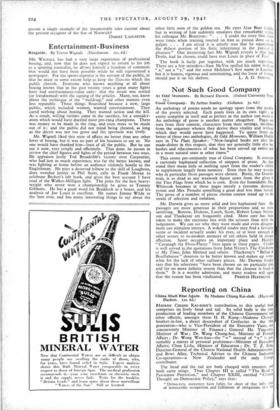Not Such Good Company
At Odd Moments. By Bernard Darwin. (Oxford University Press.
55.)
Good -Company. By Arthur Stanley. (Gollancz. 3s. 6d.) AN anthology of poems needs no apology apart from the quality of the poetry selected. Each poem lives in its own right ; an entity complete in itself and as perfect as the author can make it An anthology of prose is another matter altogether. Pages are torn from their context, characters from their settings, incidents from the sequence whence. they derive their vitality and without which they would never have happened. To quote from the better of these two anthologies, At Odd Moments, William Hazlitt says in The Plain Speaker: " New-fangled books are also like made-dishes in this respect, that they are generally little else be: hashes and rifaccimentos of what has been served up entire an in a more natural state at other times."
This seems pre-eminently true of Good Company. It contain, a curiously haphazard collection of snippets of prose. As they stand they-mean little or nothing apart from the reader's ability to supplement largely from memory. Even then he may wonder why in particular these passages were chosen. Bertie, the Guard- man, is as dead as any waxwork figure apart from the glory o: the Two Flags from which he is torn. Even the formidable Mr, Whiteoak becomes in these pages merely a tiresome domestic tyrant and Mrs. Proudie something a great deal less than herself The prose of a number of pieces chosen cannot stand up to the strain of selection and isolation.
Mr. Darwin gives us more solid and less haphazard fare. 1-1,! passages are more generous in their proportions and so more satisfying. Borrow, Dickens, Lamb, Scott, Robert Liiuis Steven- son and- Thackeray are frequently cited. More care has been taken to make the excisions less with the scissors than with the judgement. We can see why they were made and even disagree- ment can stimulate interest. A wakeful reader may find a favourite scene or incident actually under his eyes, or at least enough of other scenes to re-awaken memory of yet others held in deeper affection. Sport occupies an important place and Hazlitfr " Cavanagh the Fives-Player " lives again in these pages. Cricket is well served inthe quotations from John Nyren's The Cricketers of My Time, John Mitford and others. Thackeray's "Ballad of Bouillabaisse " deserves to be better known and makes up some- what for the lack of other culinary pieces. Mr. 'Darwin frankly says that his selections " have been chosen on no particular plan and for no more definite reason than that the chooser is fond of them." It is a worthy admission, and many readers will agree that the reason has been vindicated. FRANCIS HEATHCOTE.


































 Previous page
Previous page